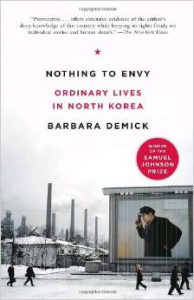 The “hermit country” of North Korea has spawned a number of books on the government and the prison system. Kang Chol-hwan’s The Aquariums of Pyongyang: Ten Years in the North Korean Gulag is a formidable example of prison literature, but leaves out an important element: just what is daily life like for ordinary North Koreans? Author Barbara Demick’s Nothing to Envy: Ordinary Lives in North Korea (2009, ISBN 078-0-385-52390-5) fills that breach in a fascinating and sobering manner.
The “hermit country” of North Korea has spawned a number of books on the government and the prison system. Kang Chol-hwan’s The Aquariums of Pyongyang: Ten Years in the North Korean Gulag is a formidable example of prison literature, but leaves out an important element: just what is daily life like for ordinary North Koreans? Author Barbara Demick’s Nothing to Envy: Ordinary Lives in North Korea (2009, ISBN 078-0-385-52390-5) fills that breach in a fascinating and sobering manner.
Through a period of more than fifteen years, Demick followed the lives six North Koreans as they lived, loved, and aspired to better things in the North Korea of Kim Il-Sung and Kim Jung-Il. The country, of course, is a military state. 20% of working-age men serve in the military, and a significant but undocumented number of civilians are engaged in snitching on their neighbors. When found guilty of a crime against the state — which can be something as simple as making a derogatory statement against the rulership — the individual is incarcerated. If the crime is perceived to be great enough, the person’s extended family can be jailed or imprisoned as well. “Tainted blood” was the term used to indict three generations of families deemed a threat to the state. Demick points to the three broad classes, as codified by the government, the core class, the wavering class, and the hostile class, and as her book suggests, falling from one class to another is common and potentially deadly.
 Some things struck us more than others. ‘Night soil’ (human excrement) is still collected and used as fertilizer, the smell noticeable in agricultural areas. Internet access and telephones were extremely restricted. An estimated 600,000 to 2 million people died in North Korea’s great famine, and by 2001, it was said that more than 100,000 North Koreans had fled — illegally of course — to China. From there, many went to South Korea to find the riches of that county initially impossible to comprehend. Becoming South Korean, therefore, had significant initial challenges, from sartorial makeovers to changing dialects. The book reads like a series of Dickensian novels, beginning with the aspirations of her characters, their attempts to thrive within the north Korean system, their realizations that life was not going to improve, and their thoughts and actions regarding leaving the country for good. Leaving family members behind is a most poignant element of their stories.
Some things struck us more than others. ‘Night soil’ (human excrement) is still collected and used as fertilizer, the smell noticeable in agricultural areas. Internet access and telephones were extremely restricted. An estimated 600,000 to 2 million people died in North Korea’s great famine, and by 2001, it was said that more than 100,000 North Koreans had fled — illegally of course — to China. From there, many went to South Korea to find the riches of that county initially impossible to comprehend. Becoming South Korean, therefore, had significant initial challenges, from sartorial makeovers to changing dialects. The book reads like a series of Dickensian novels, beginning with the aspirations of her characters, their attempts to thrive within the north Korean system, their realizations that life was not going to improve, and their thoughts and actions regarding leaving the country for good. Leaving family members behind is a most poignant element of their stories.
It’s a highly recommended book for those interested in the politics of North Korea and its effect on the day to day lives of its people. Buy this book now at the WoWasis eStore.
Leave a Reply